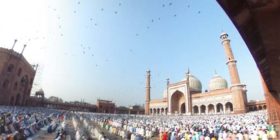The holy month of Ramadan
During Ramadan, the ninth month of the Islamic calendar, Muslims from all continents unite in a period of fasting and spiritual reflection. They abstain from food, drink, and other physical needs during the daylight hours. As a time to purify the soul, refocus attention on God, and practice self-sacrifice, Ramadan is much more than just not eating and drinking.
Holy Month
Muslims are called upon to use this month to re-evaluate their lives in the light of Islamic guidance. We are to make peace with those who have wronged us, strengthen ties with family and friends, do away with bad habits – essentially to clean up our lives, our thoughts, and our feelings. The Arabic word for “fasting” (sawm) literally means “to refrain” – and it means not only refraining from food and drink, but from evil actions, thoughts, and words.
The real meaning of Fasting
During Ramadan, every part of the body must be restrained. The tongue must be restrained from backbiting and gossip. The eyes must restrain themselves from looking at unlawful things. The hand must not touch or take anything that does not belong to it.
Fasting is not merely physical
The ears must refrain from listening to idle talk or obscene words. The feet must refrain from going to sinful places. In such a way, every part of the body observes the fast. Therefore, fasting is not merely physical, but is rather the total commitment of the person’s body and soul to the spirit of the fast.
Self-restraint
Ramadan is a time to practice self-restraint; a time to cleanse the body and soul from impurities and re-focus one’s self on the worship of God.
Ramadan Basics
The annual fast of Ramadan is considered one of the five “pillars” of Islam. Muslims who are physically able are required to fast each day of the entire month, from sunrise to sunset. The evenings are spent enjoying family and community meals, engaging in prayer and spiritual reflection, and reading from the Quran.
Observing the Fast of Ramadan
The fast of Ramadan has both spiritual significance and physical effects. In addition to the basic requirements of the fast, there are additional and recommended practices in order to gain the most benefit from the experience.
Special rules during Ramadan
The Ramadan fast is vigorous, and there are special rules for those who may find it physically difficult to participate in the fast.
Common Greetings for the Start of Ramadan
Muslims believe that this month is filled with blessings, and it is appropriate to wish them well at the beginning of the month. Friendly words in any language are welcome, such as “I hope you have a blessed Ramadan,” or “may you have a peaceful Ramadan.”
Reading during Ramadan
The first verses of the Quran were revealed during the month of Ramadan, and the very first word was: “Read!” During the month of Ramadan, as well as other times during the year, Muslims are encouraged to read and reflect on God’s guidance.
Celebrating Eid al-Fitr
At the end of the month of Ramadan, Muslims around the world enjoy a 3-day holiday known as “Eid al-Fitr” (Festival of Fast-Breaking).
When is Ramadan 2015?
Ramadan, the greatest religious observance in Islam, is an annual month of fasting. It is expected to begin on or around June 18, 2015 and will finish on or around July 16, 2015.





Leave a reply